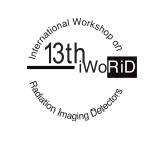Speaker
Prof.
Chan Hyoeng Kim
(Hanyang University)
Description
In industrial processes, multiphase flow is frequently encountered and it is important to examine the phase distribution and flow pattern for the optimization and maximization of the process efficiency, the safe operation and considerable cost savings. In the respect, the industrial process tomography (IPT) technique, the Single Photon Emission Computed Tomography (SPECT) which can provide cross-sectional images by using a injecting radioisotope tracer in a flow system, is considered as one of the most suitable techniques. Currently the Korea Atomic Energy Research Institute (KAERI) and Hanyang University are collaborating to develop an industrial SPECT that is composed of 24 NaI(Tl) scintillation detectors installed in lead collimators in a hexagonal configuration. In this study, a very simple method called “double-layer” method is proposed to improve the image quality of the industrial SPECT. The rationale of the method is using two layers of the identical SPECTs to increase the number of data acquisition views, i.e., from 6 to 12 angles in the present case. For this purpose, one industrial SPECT is rotated by 30 degrees with respect to another SPECT. The performance of the double-layer method was predicted by Monte Carlo simulations using MCNPX and Geant4 for different gamma sources, Tc-99m (Eγ = 140 keV) and Ga-68 (Eγ = 1,077 keV), and then the reconstruction images with 2 cm of spatial resolution were obtained by the maximum likelihood-expectation maximization (ML-EM) algorithms with 50 iterations. To quantitatively evaluate the performance of the double-layer method, the normalized root mean square error (NRMSE) was calculated. The simulation results were very prominent; that is, the double-layer method significantly improves the image quality of the industrial SPECT, especially when the distribution of radioactive tracer is not simple in the flow system.
Author
Mr
Jang Guen Park
(Hanyang University)
Co-authors
Prof.
Chan Hyoeng Kim
(Hanyang University)
Dr
Jinho Moon
(Korea Atomic Energy Research Institute)
Dr
Jong Bum Kim
(Korea Atomic Energy Research Institute)
Mr
Seo Hee
(Hanyang University)
Dr
Sung-Hee Jung
(Korea Atomic Energy Research Institute)
